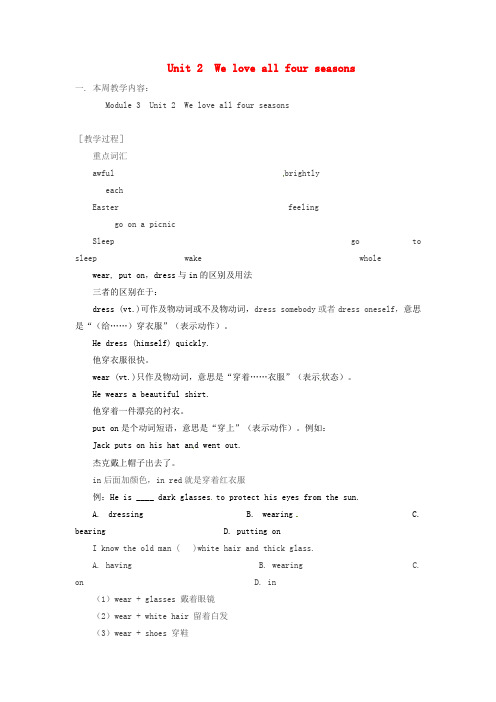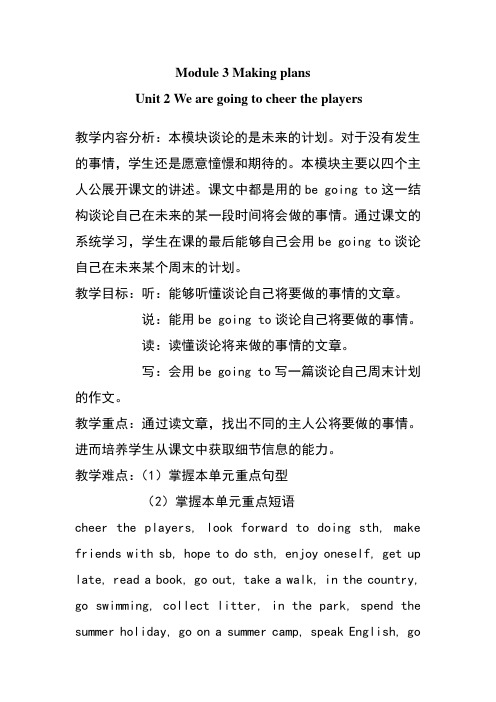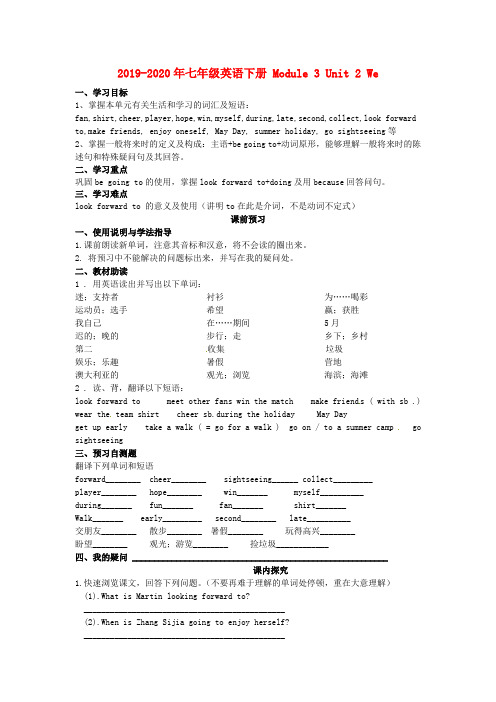陕西省山阳县色河中学七年级英语下册 Model 3 Unit 2 We are going to c
- 格式:doc
- 大小:159.01 KB
- 文档页数:3

Unit 2 We love all four seasons一. 本周教学内容:Module 3 Unit 2 We love all four seasons[教学过程]重点词汇awful brightlyeachEaster feelinggo on a picnicSleep go to sleep wake whole wear, put on,dress与in的区别及用法三者的区别在于:dress (vt.)可作及物动词或不及物动词,dress somebody或者dress oneself,意思是“(给……)穿衣服”(表示动作)。
He dress (himself) quickly.他穿衣服很快。
wear (vt.)只作及物动词,意思是“穿着……衣服”(表示状态)。
He wears a beautiful shirt.他穿着一件漂亮的衬衣。
put on是个动词短语,意思是“穿上”(表示动作)。
例如:Jack puts on his hat an d went out.杰克戴上帽子出去了。
in后面加颜色,in red就是穿着红衣服例:He is ____ dark glasses to protect his eyes from the sun.A. dressingB. wearingC. bearingD. putting onI know the old man ( )white hair and thick glass.A. havingB. wearingC. onD. in(1)wear + glasses 戴着眼镜(2)wear + white hair 留着白发(3)wear + shoes 穿鞋not…until意思是“直至某时才做某事”She didn't arrive until 6 o'clock.她直到6点才到。
Don't get off the bus until it has stopped.公共汽车停稳后再下车。



Module 3 Making plansUnit 2 We are going to cheer the players教学内容分析:本模块谈论的是未来的计划。
对于没有发生的事情,学生还是愿意憧憬和期待的。
本模块主要以四个主人公展开课文的讲述。
课文中都是用的be going to这一结构谈论自己在未来的某一段时间将会做的事情。
通过课文的系统学习,学生在课的最后能够自己会用be going to谈论自己在未来某个周末的计划。
教学目标:听:能够听懂谈论自己将要做的事情的文章。
说:能用be going to谈论自己将要做的事情。
读:读懂谈论将来做的事情的文章。
写:会用be going to写一篇谈论自己周末计划的作文。
教学重点:通过读文章,找出不同的主人公将要做的事情。
进而培养学生从课文中获取细节信息的能力。
教学难点:(1)掌握本单元重点句型(2)掌握本单元重点短语cheer the players, look forward to doing sth, make friends with sb, hope to do sth, enjoy oneself, get up late, read a book, go out, take a walk, in the country, go swimming, collect litter, in the park, spend the summer holiday, go on a summer camp, speak English, gosightseeing, have a picnic, on the beach.教学过程:step1: warm-up. ask ss to say several phrases in Module 3 Unit 1.S tep 2: give ss several sentences, let ss ask.For example: I am going to/ You/We/They are going to/ He/She/It is going to go over lessons tomorrow. Let ss ask: What are you going to do tomorrow? What is he/she/it going to do tomorrow? What are we/they going to do tomorrow? Then ask student to answer: I am going to…..We/They/You are going to… He/She/It is going to..Step 3(a) Ask ss to make a dialogue. For example: One student asks What are you going to do?The other student answers: I am going to…(b) ask ss to show their performance.Step4: (a) Ask ss to read the passage in activity 1 and find out what is Lucy, Martin and Zhang Sijia going to do.(b) let ss answer by using Lucy/Martin/Zhang Sijia is going to…Step5: Ask ss: What are you going to do onSaturday/Sunday morning/afternoon/evening?进而引入本篇作文:用be going to 和本单元及上单元学的短语谈论自己的周末计划。

2019-2020年七年级英语下册 Module 3 Unit 2 We一、学习目标1、掌握本单元有关生活和学习的词汇及短语:fan,shirt,cheer,player,hope,win,myself,during,late,second,collect,look forward to,make friends, enjoy oneself, May Day, summer holiday, go sightseeing等2、掌握一般将来时的定义及构成:主语+be going to+动词原形,能够理解一般将来时的陈述句和特殊疑问句及其回答。
二、学习重点巩固be going to的使用,掌握look forward to+doing及用because回答问句。
三、学习难点look forward to 的意义及使用(讲明to在此是介词,不是动词不定式)课前预习一、使用说明与学法指导1.课前朗读新单词,注意其音标和汉意,将不会读的圈出来。
2. 将预习中不能解决的问题标出来,并写在我的疑问处。
二、教材助读1 . 用英语读出并写出以下单词:迷;支持者衬衫为……喝彩运动员;选手希望赢;获胜我自己在……期间 5月迟的;晚的步行;走乡下;乡村第二收集垃圾娱乐;乐趣暑假营地澳大利亚的观光;浏览海滨;海滩2 . 读、背,翻译以下短语:look forward to meet other fans win the match make friend s ( with sb .) wear the team shirt cheer sb.during the holiday May Dayget up early take a walk ( = go for a walk ) go on / to a summer camp go sightseeing三、预习自测题翻译下列单词和短语forward________ cheer________ sightseeing______ collect_________player________ hope________ win_______ myself__________during_______ fun_______ fan_______ shirt_______Walk_______ early_________ second________ late__________交朋友________ 散步________ 暑假________ 玩得高兴________盼望________ 观光;游览________ 捡垃圾____________四、我的疑问 __________________________________________________________课内探究1.快速浏览课文,回答下列问题。

Unit 2 We’re going to cheer the players.ⅠTeaching modelReading and writing .ⅡTeaching methodTop-down approachⅢTeaching aims1. Listening and understanding familiar topics (plans).2. Talking about familiar topics (plans).3. Reading and understanding simple passages.4. Composing a simple passage.ⅣTeaching ObjectivesⅤTeaching aidsRecorder, OHP, videoⅥTeaching StepsStep 1 Warming-up1. Guessing game.1) Show some pictures.2) According to the information given and ask the students to guess: What are you going to do?3) Show the pictures to check the answers.2. Review the text of Unit 1.3. Read the words after the teacher.Step 2 Learn new words.1. Show some pictures.2. Talk something about the pictures.3. Introduce the new words.4. Read the words after the teacher.Step 3 Reading.1. Play the recording and listen to the tape carefully.2. Ask the students to read through the passage.4. Check with a partner.5. Call back the answers from the whole class.6. Read the text together.7. Learning to learn.When a passage has pictures, the pictures often contain some important information. So look at the pictures before you read, as this will make the passage easier to understand.Step 4 Work in pairs.1. Ask the students to read through the passage again.2. Ask and answer the questions.1) When is Martin going to watch a football match?2) What does Martin hope?3) What is it going to be a busy holiday for Zhang Sijia?4) Why is this summer holiday going to be different for Lucy?5) Who is Lucy going to stay with?3. Check with a partner.4. Call back the answers from the whole class.Step 5 Complete the passage.1. Ask the students to the words in the box in Activity 4.2. Ask the students to read through the passage in Activity 4.Martin and his friends are going to watch their favouritefootball team play and (1) __________ the (2) ___________. It’s going to be great (3) ___________ and they (4) ____________ their team gets the best score and (5) _____________ the match. Zhang Sijia is going to do (6) _____________ with her family and friends on May Day. They’re going to take a walk or go (7) ______________. There’s a lot of (8) ___________ in the park, and on 2nd May, they’re going to (9) _____________ it. (10) ______________ her summer holiday, Lucy is going to a summer (11) _______________ and is going to stay with a(n) (12) _____________ family. They’re going to the (13 ) ______________ and are going (14 ) ______________. She’s really looking (15) ______________ to her holiday in Australia.3. Complete the passage with the correct form of the words from the box.4. Check with a partner.5. Call back the answers from the whole class.6. Read the passage together.Step 6 Writing.1. Look at the question and answer.—Why is Martin looking forward to tomorrow ?—Martin is looking forward to tomorrow because he and his friendsare going to watch their favourite team play football.2. Now write answers to the questions. Use because.1) Why is Zhang Sijia going to a park near her friend’s house?2) Why is this summer holiday going to be very different for Lucy?3. Work in pairs. Ask and answer the questions.1) What are you looking forward to this weekend?2) What are you going to do?3) Why are you going to do it?4. Now write about your partner.… is going to see a movie on Saturday evening. He is looking forward to it because he likes the actors in it.Step 7 Homework书面表达根据下列信息,写篇80字左右的文章。
Module 3 ChangeUnit 2 We love all four seasons1Language focus:Using the simple present tense to express thoughtse.g. Spring makes me think of rain.Using adjectives to describe events.e.g. It is awful to walk in tense to expression simple truths.Using the simple present tense to express simple truthse.g. The weather starts getting warm.Using proper nouns to refer to eventse.g. Easter is spring.Language skills:ListeningRecognize differences in the use of intonation in questions, statements (including approval and disapproval), mands, and respond appropriatelyIdentify details that support a main ideaListen for specific informationSpeakingUse appropriate intonation and stress, and vary volume, tone of voice, and speed to convey intended meanings and feelingsReadingRead written language in meaningful chunks.Materials:Student’s Book 7B page 53Cassette 7B and a cassette playerPreparation:Cue the cassette.Pre-task preparationLanguage learning activity(This section aims at providing students with opportunities to practise the language/vocabulary needed or bee familiar with the background for the task that follows.1. Play the recording: Look and read. Stop after Picture2. Students listen and follow in their books.2. Play the recording again. Students listen and repeat.3. Ask: What does spring make you think of ? to elicit: Spring makes me think of … Encourage students to volunteer anything that es to mind. Help them write a list on the board. Then draw a spidergram like the one i n the Student’s Book and invite a more able student to e forward and plete the spidergram with the information given on the list.ConsolidationGrammar Practice Book 7B page 41.2Language focus:Using the simple present tense to express simple truthse.g. In writer, the weather starts getting cold and dry.Using adjectives to show quantitiese.g. Some leaves bee brown, red or yellow.Using adjectives to describe eventse.g. It is fun to go to the beach in summer.Language skills:ListeningIdentify the main ideas of a new topicIdentify details that support a main ideaListen for specific informationSpeakingUse appropriate intonation and stress, and vary volume, tone of voice, and speed to convey intended meanings and feelingsReadingRead written language in meaningful chunksRecognize recurrent patterns in language structureSkim a text to obtain a general impression and the main ideas.WritingDevelop written texts by expressing own ideas and feelingsWrite out piece of work by presenting writing using appropriate layout and visual support including illustrations, tables, charts where necessaryMaterials:Student’s Book 7B pages 53 and 54Cassette 7B and a cassette playerWorkbook 7B page 27Photocopiable pages 47 and 48Preparation:Cue the cassette. Make a copy of Photocopiable pages 47 and 48 for each student.Pre-task preparation1. Play the rest of the recording for Look and read. Students listen and follow in their books.2. Play the recording again. Students listen and repeat.3. Write the following adjectives: awful, interesting, nice, fun, important, had and dangerous on the board. Ask for students’ opinions: Is it awful/interesting/nice/fun/important/bad/dangerous to … ?4. Write three verbs: start, like and love on the board. Say: I start working at 8 a.m. I like walking to school. I have doing exercise. Ask: What form of verb should we use after ‘start’, ‘like’ and ‘love’? to elicit: We should use the-ing form of verb. Invite a few of the more able students to think of some more sample sentences using the three verbs.Post-task activityWorkbook page 27ConsolidationGrammar Practice Book 7B pages 42 and 43.3Language focus:Asking ‘Wh-’ questions to find out about a specific objecte.g. Which one could be the first slide?Using adjectives to show order.e.g. Picture 2 could be the first slide.Using the simple present tense to express preferencese.g. I prefer Picture 11 to Picture 4.Language skills:SpeakingOpen an interaction by eliciting a response by asking questionsMaintain an interaction by agreeing or disagreeing, replying.Maintain an interaction by asking and responding to others’ opinionsWritingGather and share information, idea and language by using strategies such as brainstorming, listing.Plan and organize information and ideas by deciding on the sequence of content Develop written texts by expressing own ideas and feelingsRevise and edit drafts by sharing work with teachers and classmates and responding positively to their suggestions on ideas and use of language.Materials:Student’s Book 7B page 55Cassette 7B and a cassette playerWorkbook 7B page 28Photocopiable page 49Preparation:Cue the cassette. Make a copy of Photocopiable page 49 for each student.Pre-task preparation1. Introduce the two new lan guage structures to students: ‘either… or…’ and ‘prefer … to …’ To introduce the first structure, say: I’ve lost my pen. It could either be in the staff room or in the laboratory. To introduce the second structure, say: I prefer coffee to tea. Give a few more examples you can think of.2. Also review the ordinal and cardinal numbers with students if necessary.Post-task activityWorkbook page 28ConsolidationGrammar Practice Book 7B page 44,46 and 47.。
We are going to cheer the players
学习目标Important and difficult points:
1.What are you going to do? 及回答
2. Key vocabulary. Key structures.
“be going to”计划、安排
学习重难点:
Key vocabulary.
Key structures.
“be going to”计划、安排
时间导课分、自学分、交流分、展示分、小结分、巩固分
学习流程Learning Steps:
I.【预习-展示-反馈】
重点单词: fan, cheer, player, hope, win, during……
重点短语:look forward to, make friends, enjoy oneself, May
Day, take a walk, summer holiday, go sig htseeing,have a
picnic,
重点短语:
1.期盼、盼望__________
2. 交朋友____________
3. 过得愉快________
4.五一劳动节______________
5. 出去___________
6.散步___________
7 暑假______ ___ 8. 夏令营___________
9.去观光___________ 10.捡垃圾________________
重点句型:
1.I am __________ __________ ___________(期盼)the football
match tomorrow.
2. I’m going to __ ___ (享受)myself during
the . . (五一劳动节)
3.We are going to _____ _____ (拣垃圾)in the park.
4. We are going (观光)and going to a
(野餐) .(在海滩上)
5.I’m going to _____ _______ _____ (散步) this afternoon.
自读课文,回答下列问题。
1. When is Martin going to watch a football match?
2. What does Martin hope?
3. Why is it going to be a busy holiday for Zhang Sijia?
4. Why is this summer holiday going to be different for Lucy?
5. Who is Lucy going to stay with?
II.课堂学习研讨
知识点链接:
1、I’m looking forward to the football match tomorrow. 我
期待着明天的足球赛。
I’m looking forward to seeing you again.
能力目标:
通过听、说、读、
写继续学习描述
人的计划、安排。
情感目标:激发
学生学习英语的
兴趣,了解不同
民族,不同人群
的休闲安排。
重点学习句型:
be going to do
sth.
look forward
to…
2. because作连
词的用法
小组总结look forwar d to的用法,其后面可接名词或动名词。
to 是介词,不能把to看成不定式的符号。
介词后面要跟动名词形式,学过的有be good at doing sth. /What about doing sth./Thanks for doing sth.等。
2.I’m going to enj oy myself during the May Day holiday.我要在五一假期好好玩一玩。
【议一议】enjoy oneself 意为______________________它的近意短语是。
注意oneself 是物主代词,在句子中它的形式要和主语保持一致。
如:I enjoy myself .
You enjoy yourself . He enjoys himself .
She enjoys herself . We enjoy ourselves .
You enjoy yourselves . They enjoy themselves.
【练一练】翻译:
祝你开心!__________________________.
ually I spend the summer holiday at home .通常我在家过暑假。
spend在这里是“度过”的意思;spend: 还有花费,花(钱)的意思,后面可接花费“一些时间/金钱”
spend some time/ money on sth.在...上花费时间 / 金钱 e.g. He spends an hour on his homework every day.
spend some time/ money (in) doing sth.花费时间 / 金钱做某事 e.g. He spends an hour (in) doing his homework every day.
4. 小组内练习朗读Activity 5归纳because的用法
because表示直接原因,回答why引导的问句或引导原因状语从句。
引导原因状语从句时,一般放在主句之后。
eg.——Why are you late for school? ——Because I get up late. He is not happy because his dog is lost.
III.巩固练习
一、能力提升题。
根据汉语意思,完成句子。
1. 星期五是Lisa的生日聚会, 我结识了一些新朋友。
It’s Lisa’s farewell party on Friday, I_____ some new ______ at this party.
2.她喜欢躺在沙滩上。
She likes to lie _ _ __ _ __ ___.
3. 这周我打算好好享受我的周末。
I’m going to __ __ ___ ___ this weekends.
4. 今年暑假我打算去观光。
I’m going to _ _ __________ this summer holiday.
5. 她期待新的学期。
She’s _______ ____ __ _ _ new term.
二、根据课文内容填空。
Martin and his friends are going to watch their favourite football team play and (1) __________ the (2) ___________. It’s going to be great (3) ___ and they (4) ____ their team gets the best score and (5) ____ the match. Zhang Sijia is going
to do something with her family and friends on May Day.
They’re going to take a walk or go (6) _________. There’s
a lot of (7) _____ in the park, and on 2nd May, they’re going
to (8) ______ it.(9) ______ her summer holiday, Lucy is going to a summer (10) _____ and is going to stay with a(n) (11) _________ family. They’re going to the (12) ______ and are going (13) __________. She’s really looking (14) _______ to her holiday in Australia.
课
堂
反
思。